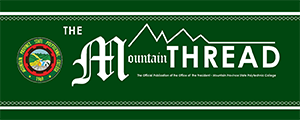The 119th Anniversary of the Civil Service Commission (CSC) was commemorated by various agencies in Mountain Province through an opening program that featured different presentations by government employees on September 2, 2019 at the Provincial Plaza.
The celebration was collaboratively spearheaded by the CSC, MPSPC and the Army Reserve Command (ARESCOM), with the theme “Civil service at 119: Upholding integrity and building a high trust society”.
What was more striking during the celebration was the message, both literal and implied, of Dr. Rexton F. Chakas. Armed with his innate public speaking acumen, the MPSPC President, as usual, delivered his speech with strong conviction and fortitude that centered on a low-trust and a high-trust society and workplace. For a listener who has a critical level of listening, one could surmise that any workplace or organization might need to subscribe to a certain culture of trust, integrity, and efficient public service. More importantly, one can also postulate that in building that particular culture, a wide array of elements need to work in coordination in order for an organization to function well. These elements, as outlined in the speech of Dr. Chakas include supervision, evaluation, span of control, motivation, and structure and systems. Because a discourse on civil service was the main highlight of the celebration, Dr. Chakas situated his discussion in the workplace.
Contextualizing this dichotomy of low- versus high-trust culture in MPSPC warrants an examination of where we stand at present. Are we in that context where disobedience and divergence define our system, or are we in that framework where adherence and agreement dominate our practices? Maybe for some thinkers, is it necessary to embrace this dichotomy, or does it work better if we safely situate ourselves within the middle, or closer to either end of the spectrum? For MPSPC as an academic institution of higher learning, we are not exempted from this tradition. Because of the importance of the delivery of services to our main clientele – the students – we are also challenged to develop and nurture a high-trust culture, but we may need to start from a low-trust culture and gradually evolve into a high-trust institution. As Dr. Chakas emphasized, “Evolving into a high trust society is not done overnight. I doubt it can be done in 20 years.” Indeed, the message of Dr. Chakas strongly conveys a lesson, a moral, an example, and maybe even a warning that any organization could embrace as it starts to build a high-trust culture within its premises.
A low-trust society, according to Dr. Chakas, experiences high levels of corruption and inequality. He used the case of one of the rules in MPSPC, particularly on the prohibition of the chewing of momma inside the College’s campuses. He asked, “Why is there a divergence in the behaviour of the faculty, staff, and students; why do some students obey while others do not?” These questions are valid. The College President went on and answered these questions, “Because they know they will not be apprehended; because they do not trust out law and rule enforcers; because the security guards are not doing their job; because there is inequality.”
Let us take the case of faculty members who demonstrate divergence in behaviour, say, not attending one session of class or not going to the classroom promptly. The norm for adult, thinking and honest instructors is attending their classes regularly and starting their classes promptly. But why is it that evidence of divergence still persists? Perhaps, the answer lies in the essence of integrity and accountability. Dr. Chakas stressed, “To my mind, integrity is an important ingredient in the evolution of our society into a high trust one. If there is a rule of law and accountability in our society, then people will trust each other and the institutions that regulate and govern their affairs.” He encouraged everyone and said, “Try being honest and your world will be contaminated; try being reliable and your world will be infected by it; be truthful and other will follow suit.”
On the other hand, a high-trust culture and society rests on a common understanding among the members of the organization of what is expected. A high trust culture is a place where management does not require voluminous reports one after the other because it trusts that the members are doing what is expected of them. In MPSPC, faculty members and administrative staff have their respective responsibilities that they are expected to fulfill. As members of this institution, all members have a common understanding that basic services, in support of the delivery of quality education, rests upon individual and collective integrity, that is, we perform our functions even without other people seeing us, commanding us, or pushing us beyond the limits. Dr. Chakas stated, “In a high-trust culture, a manager becomes a facilitator, helper, cheerleader, adviser, counsellor, and coach.
As we end the month of September and move beyond the celebration of the Civil Service Month, we may still need to embrace the debate on whether we are working within a low- or high-trust culture. As we also continue to work towards universityhood, we might need to be incessantly guided with the discourse on upholding integrity and building high trust society.




















